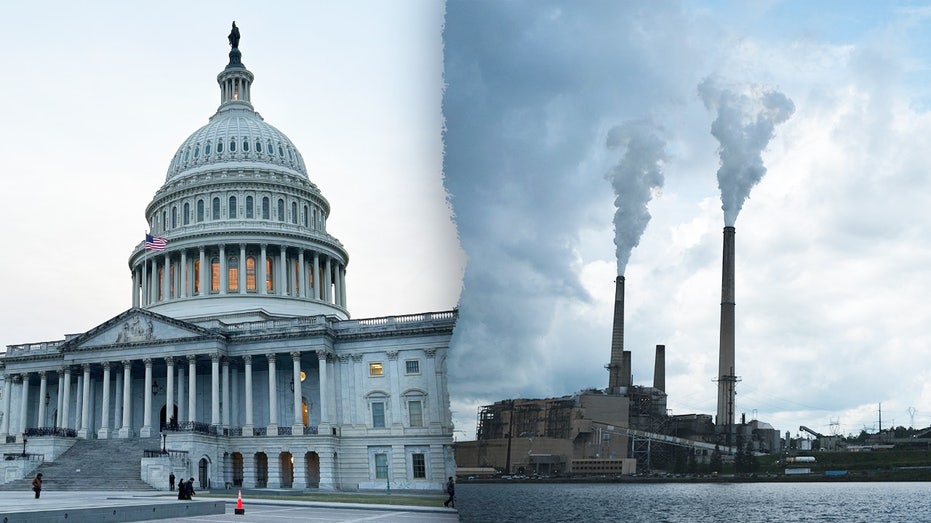Rapid rise of AI puts new urgency on Congress to unleash American energy
The rapid advancement of artificial intelligence is putting newfound urgency in the push for Congress to streamline the permitting process for new energy projects.Permitting reform, which refers to efforts to streamline the approval of new energy projects, is one of the rare issues in Congress that still has bipartisan backing.But the exact details and scale of permitting reform, including deregulatory efforts, have been subject to contentious debate."What we're seeing right now in China is a historic build-out of their grid. Of course, adding nuclear, adding a lot more oil and gas, but in addition to that, they're adding a lot of coal as well. That is a country that is really focused on using all the energy that they have to build out, to supply the AI future and a growing citizenship," Mike Sommers, CEO of the American Petroleum Institute (API), told Fox News Digital.HOUSE PASSES TRUMP-BACKED PLAN TO AVERT GOVERNMENT SHUTDOWN"What we don't see at the federal level or at the state level in the United States is that same kind of effort. And the first key to that is to get a permitting reform bill done that gives our private sector the ability to actually build things."Global electricity demand for AI data centers is projected to double between 2022 and 2026, according to the International Energy Agency.In the U.S. alone, AI data centers accounted for more than 4% of all U.S. electricity use in 2023, according to the Electric Power Research Institute, and could more than double to 9% by 2030. One AI data center could use as much power as 50,000 U.S. households.It's part of what's driving the House Committee on Natural Resources to advance bipartisan legislation, led by Chair Bruce Westerman, R-Ark., and Rep. Jared Golden, D-Maine, to make the permitting process easier."We're seeing unprecedented demand for electricity in particular. It was kind of flat. And now the year-over-year increase, we're seeing a three-fold uptick in the demand for electricity. And the numbers that I'm being told almost seem irrational like a data center that's close to my districtthey're talking about three gigabytes of power from one data center," Westerman told Fox News Digital."To put that in perspective, I've got nuclear power plants in my district, each reactor is a gigabyte. So you're talking about three nuclear reactors to power one data center."He said the U.S. has "gotten way behind the eight-ball in being able to meet the demands that are out there."Sommers warned that a failure to act soon could lead to skyrocketing costs for everyday Americans."If we can't figure out a way to get more energy on the grid, when we expect energy demand to go up by 35 to 40% by 2040, consumers are going to revolt," he said. "And if they revolt, what that means is that there's going to be fewer data centers, fewer investments in AI, and that makes America at an economic disadvantage to China."Earlier this month, API released a policy roadmap with recommendations for Congress to create "durable, comprehensive solutions that cut red tape, sets clear deadlines and provides legal certainty" in unleashing American energy, according to a memo viewed by Fox News Digital.OLD SMARTPHONES ARE BEING TURNED INTO TINY DATA CENTERSSommers also described a "full-throated effort" by API to get their plan into lawmakers' hands, including in-person advocacy on Capitol Hill and a "major seven-figure" advertising campaign inside Washington."We're not seeing a crisis now, but there is a crisis coming. And if we can get permanent reform done now, it'll clear the way for that dominance in both energy and in AI that's going to be required if we're going to win the future," he said.Meanwhile, the current U.S. energy grid and permitting process was not designed to take the skyrocketing use of AI into account, Westerman said."It was done 50-some odd years ago, when it was put in place," he said.The Arkansas Republican conceded the National Environmental Protection Act and other similar pieces of legislation were critical when they were passed in the early 1970s."All of those were put in place with the right motives, but over time, they've been weaponized and politicized, where they're used more to stop projects than they are to benefit the environment," Westerman said. "I contend that we're hurting the environment by having a poor permitting process."He emphasized, however, that any solution needs to be bipartisan, pointing to the Senate's 60-vote threshold for any successful legislation."There's a lot that agree it needs changing, and the challenge is to find out where we all agree on the same things, how it needs to be changed," Westerman said. "I think for the benefit of the country, we have to work together in a bipartisan manner."




